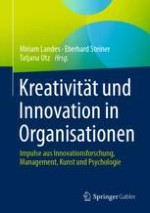2022 | OriginalPaper | Buchkapitel
Wie kreativ kann Künstliche Intelligenz sein? Eine psychologische Reflexion
verfasst von : Matthias Spörrle, Sebastian Hofreiter
Erschienen in: Kreativität und Innovation in Organisationen
Verlag: Springer Berlin Heidelberg
Aktivieren Sie unsere intelligente Suche, um passende Fachinhalte oder Patente zu finden.
Wählen Sie Textabschnitte aus um mit Künstlicher Intelligenz passenden Patente zu finden. powered by
Markieren Sie Textabschnitte, um KI-gestützt weitere passende Inhalte zu finden. powered by
